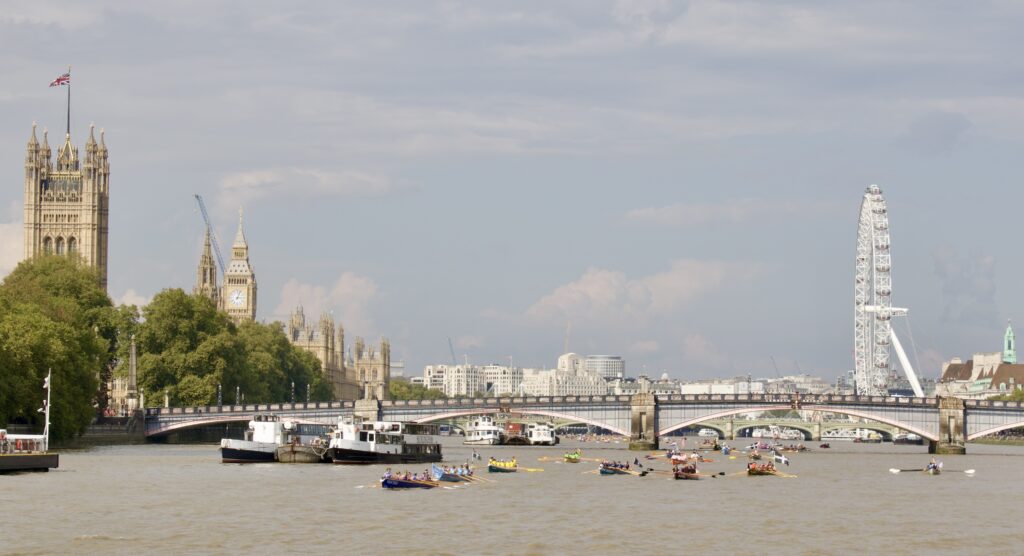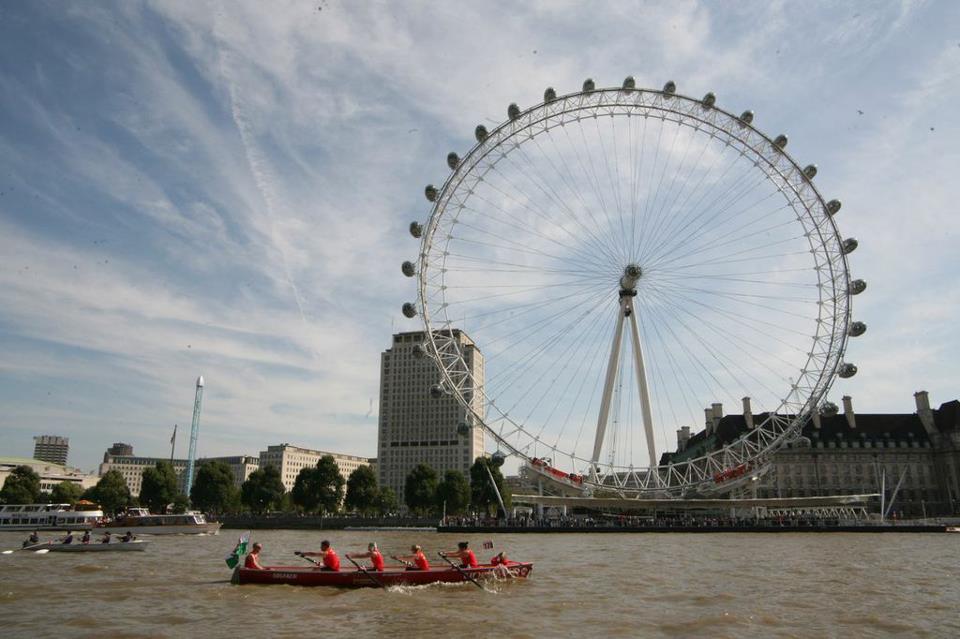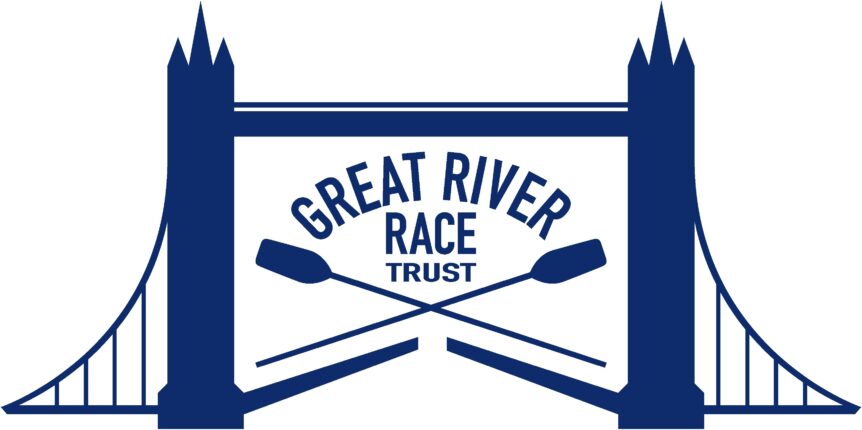🚣♀️🚣♂️ Known as London’s River Marathon hundreds of crews are set for the annual Great River Race, a spectacular boat race on the River Thames on Saturday 20 September. Spectating is free!
A great day out for both competitors and spectators alike the Great River Race takes place on Saturday 20 September over a 21.6-mile route featuring no less than 28 bridges. The race starts in the Docklands at 1.15pm (time tbc). The fastest boats will finish in Richmond just over two hours later.
A colourful celebration of over 250 boats of all shapes and sizes are expected to to compete. The race attracts every level of fixed seat rower. From dedicated athletes set on winning, to those racing for charity. Crews from the UK will be joined by competitors from a range of other European countries, as well as America and Australia. Last year in the region of 1500 people will take part.
A highlight of traditional fixed seat rowing events, it includes Thames Cutters in full regalia from the Worshipful Companies of Founders, Tallow Chandlers and Glaziers.

The Great River Race is open to any traditional style boat powered by a minimum of 4 oars or paddles. The race is based on the Watermen principle. This means each crew must carry a passenger and cox along with a 3’ x 2’ flag. A handicapping system is used to ensure fair play.
Many competitors have returned year after year to take part in the event, since it launched in the late 80s. The race has raised thousands of pounds for charity.
RACE ROUTE
The race route is from Millwall to Richmond in Surrey. From around 10am onwards competing crews arrive at Millwall Riverside to register and prepare their boats for the launch.
Millwall Dock Slipway (opposite the Docklands Sailing Centre) is where the race starts at 1.15pm (time tbc), on the starter firing the maroon to start. The boats leave on a ‘slowest first, fastest last’ handicap basis, giving all crews an equal chance.
The race heads west taking in bridges such as Tower Bridge, Westminster Bridge, Battersea Bridge and Putney Bridge. The first boats finish at the riverside, next to Ham House in Richmond (see below for postcode/what3words address) at approximately 3.15pm (time tbc). Boats will continue to come over the finish line for a couple of hours afterwards.
The race winner crosses the line to a cannon broadside and the prospect of receiving The Challenge Trophy of The Company of Watermen & Lightermen. The winning boat becomes the UK Traditional Boat Champions in the process.
The finish area will host a prize-giving ceremony with refreshments available from food stalls and a bar. Following the prize-giving there will be live music with a DJ attendance. The finish is at postcode TW10 7RS and what3words location ‘snake.safely.puff’.
2024 RESULTS
CONGRATULATIONS to the Salter Skiff, Salty, crewed by the Four Oars Rowing Club who posted the fastest overall time (on handicap), to win the Challenge Trophy of the Company of Watermen and Lightermen of the River Thames at the 2024 Great River Race.
270 crews took part in the 21.6 river marathon, on a mostly bright and sunny day. Conditions soon settled from a choppy start, and crews rowed strongly to the finish at Ham – many racing to the very last stroke!
37 trophies were awarded at the Great River Race. The fastest overall female crew on
handicap was WSV Woudrichem rowing a St Ayles Skiff; the fastest mixed crew on handicap
was Burra Rowing Club racing a Shetland Yaol; the fastest male crew (not on handicap) was
the Caradon Pilot Gig Club, and the fastest female crew (not including handicap) was Bristol
Gig Club, both in a Cornish Pilot Gig.
2025 TIMINGS & SPECTATING

*Note: Timings are based on 2024 and subject to confirmation.
** The finish area is at postcode TW10 7RS and what3words location ‘snake.safely.puff’.


ABOUT THE GREAT RIVER RACE
Introduction
The Great River Race has firmly established itself in the sporting calendar since its debut in 1988. To such an extent that experienced crews describe it as a classic event – the one they all want to win.
And with its intriguing mix of colour, spectacle, intense competition and casual fun, it combines all the ingredients that made London’s ‘other’ marathon such a success. With with the addition of dozens of great photo opportunities as the race progresses from the striking Docklands skyline at the start, through central London until it reaches its semi-rural Surrey conclusion.
The Great River Race attracts both the true racer and the leisure rower and, in developing into ‘London’s River Marathon’, is doing for rowing what the ‘Road Marathon’ did for running. Not surprising when the course is a gruelling 21.6 miles from London Docklands to Richmond.
Great River Race – How it started
The Great River Race was inspired by the immense interest generated by a 1987 charity event in which the famous Doggett’s Coat & Badge winners from The Company of Watermen & Lightermen rowed its shallop, or passenger barge, from Hampton Court to The Tower of London.
The idea that emerged was to find the UK Traditional Boat Champions by issuing an all-comers challenge to beat the Doggett’s men – racing on a handicap basis. Entries were restricted to traditional-style, coxed craft powered by a minimum of four oars or paddles. And, in keeping with the Company’s historic responsibility to apprentice and licence Watermen to carry passengers on the tidal Thames, each boat had to carry a passenger.
To give all crews an equal chance, entrants were handicapped according to the calculated potential performance of their boats. This was done on a scientific basis, using naval architects’ calculations and a sophisticated computer programme. And, to add spice to the contest, it was to be run on a ‘slowest away first, fastest last’ pursuit basis, with every boat individually timed over the course. Despite a start line handicap period of well over an hour, some close racing was expected – and achieved.
The winners on handicap would hold, for one year, the handsome Challenge Trophy of The Company of Watermen & Lightermen – featuring a mounted original Watermen’s badge – issued to William Savage of Gravesend in 1803.
The story so far
In 1988, 61 entrants chose more than 20 boat types representing six countries, including an Hawaiian outrigger war canoe, Viking longboat, Norwegian scow, Canadian C-8 canoe, Chinese dragonboat, and numerous Cornish pilot and other gigs, skiffs, cutters, ASC, naval whalers and the like to take on the Watermen’s shallop, star of the film ‘A Man For All Seasons’.
The boats were propelled by a bunch of enthusiasts ranging from barely teenage Sea Scouts to hardened offshore rowing veterans more used to racing anywhere from the south coast to the south seas and entered by such diverse outfits as museums, rowing clubs, pubs, youth organisations, police, fire brigades, the armed services, boating societies and groups just out take part and beat the course. And beat it they did, with just one starter failing to finish.
From strength to strength
Since then the Race has gone from strength to strength. While more than quadrupling in size, it has attracted many fascinating entries. This includes a magnificent replica 54′ bronze age Greek galley. Also canvas and tar Irish naomhogs of the type reputed to have crossed the Atlantic in the eighth century. And a new shallop and Thames wherry, both constructed along traditional lines especially for the Race. The world’s oldest racing rowing boat, the ‘Royal Oak’ built in Co. Down, Northern Ireland, at the beginning of 1800s has also taken part. Not to mention our own Thames Watermen Cutters, the Great River Race Jolly Boat, and now the Skerry. All three built for the Race by Mark Edwards at Richmond Bridge Boathouses.
The Race has attracted a stellar cast of celebrity starters along the way. Each firing the cannon to get the Race under way. These have included Sting, Jerry Hall, Sir Steven Redgrave and the late June Brown (EastEnders’ Dot Cotton). Also Sir Trevor MacDonald, Jane Horrocks, Virginia Bottomley MP, William Franklin, Tony Banks MP, Dame Tanni Grey Thompson and many more.
The Race has truly become an international event with crews coming from far and wide. For example Australia, America, Bermuda, Canada, Croatia, Poland, Holland, Italy and Sweden. Also France, Germany, Ireland, Romania and the Channel Islands, as well as all over the UK.
Great River Race – 2009 to the present day
After much soul searching, careful calculations and protracted consultations, the route was reversed in 2009. The meant the Race’s direction was changed to run upriver from Millwall to Ham. It has proved so popular with competitors and spectators it has been adopted as the regular format.
The Great River Race has become the biggest and most prestigious event of its kind in Europe. In 2023 entries featured over 300 boats carrying around 2,500 competitors racing for 36 trophies.
History of the race courtesy of the Great River Race website.
👀 LOVE LIVE SPORT? Visit our ‘What’s On’ page here for the No. 1 guide to spectator experiences coming up in LONDON. And to ensure you don’t miss a moment of the action subscribe here to our newsletter. 👀


